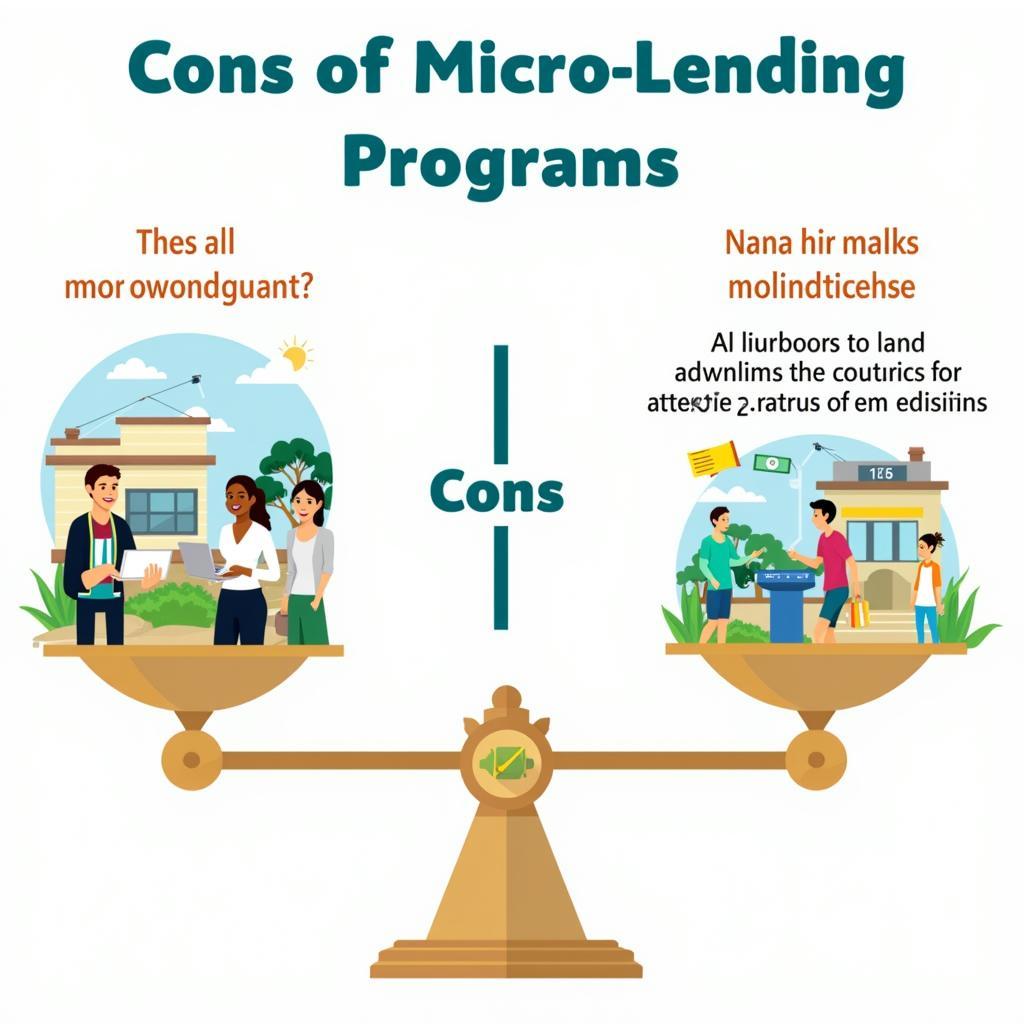Micro-lending and its impact on economic inclusion is a topic that has gained significant attention in recent years. This subject has appeared in several IELTS Writing Task 2 questions, particularly in questions related to economics, social development, and poverty alleviation. Based on past trends and the growing relevance of this topic, it is likely to continue appearing in future IELTS exams.
Let’s examine a relevant IELTS Writing Task 2 question that addresses this topic:
Some people believe that micro-lending programs, which provide small loans to individuals in developing countries, are the most effective way to reduce poverty and promote economic growth. To what extent do you agree or disagree with this statement?
Analyzing the Question
This question requires candidates to discuss their opinion on the effectiveness of micro-lending programs in reducing poverty and promoting economic growth in developing countries. Key points to consider:
- The main focus is on micro-lending programs
- The context is developing countries
- Two potential benefits are mentioned: reducing poverty and promoting economic growth
- Candidates need to express the extent of their agreement or disagreement
Sample Essays
Band 8-9 Essay
Micro-lending programs have gained considerable attention as a potential solution to poverty and economic stagnation in developing nations. While I largely agree that these initiatives can be highly effective, I believe they should be part of a more comprehensive approach to economic development.
Micro-lending programs undoubtedly offer several significant advantages in combating poverty. Firstly, they provide access to capital for individuals who would otherwise be excluded from traditional banking systems due to a lack of collateral or credit history. This financial inclusion enables entrepreneurs to start or expand small businesses, creating income-generating opportunities not only for themselves but also for others in their communities. Moreover, these programs often target women, who are disproportionately affected by poverty, thus promoting gender equality and empowering a historically marginalized group.
Furthermore, micro-lending can stimulate economic growth at the grassroots level. By fostering entrepreneurship and innovation, these programs can lead to the development of diverse local economies. As small businesses grow, they create jobs and increase purchasing power within communities, leading to a multiplier effect that can boost overall economic activity. Additionally, successful micro-enterprises often reinvest their profits locally, further contributing to community development and economic resilience.
However, it is important to recognize that micro-lending alone is not a panacea for poverty and economic underdevelopment. While it can be a powerful tool, it must be complemented by other initiatives to achieve sustainable, long-term growth. For instance, investments in education and vocational training are crucial to equip individuals with the skills needed to effectively manage their businesses and adapt to changing market conditions. Similarly, improvements in infrastructure, healthcare, and legal frameworks are essential to create an environment conducive to economic growth and poverty reduction.
In conclusion, while I strongly believe in the potential of micro-lending programs to reduce poverty and promote economic growth, I contend that they should be part of a holistic approach to development. By combining micro-lending with other targeted interventions, developing countries can create a more robust and sustainable path towards economic prosperity and social progress.
 Micro-lending empowering entrepreneurs in developing countries
Micro-lending empowering entrepreneurs in developing countries
Band 6-7 Essay
Micro-lending programs have become popular in recent years as a way to help poor people in developing countries. While I think these programs can be helpful, I don’t completely agree that they are the most effective way to reduce poverty and boost economic growth.
One major benefit of micro-lending is that it gives poor people access to loans they wouldn’t normally be able to get from banks. This allows them to start small businesses or expand existing ones, which can help them earn more money and improve their lives. For example, a woman might get a small loan to buy a sewing machine and start a tailoring business, or a farmer could borrow money to buy better seeds and increase crop yields.
Another advantage is that micro-lending can help local economies grow. When people start businesses, they often hire others or buy supplies locally, which spreads the benefits around the community. This can lead to more jobs and more money circulating in poor areas, which is good for overall economic growth.
However, I don’t think micro-lending alone is enough to solve poverty and boost economies. There are other important factors that need to be addressed. For instance, people need education and training to run businesses successfully. Also, things like good roads, reliable electricity, and access to markets are necessary for businesses to thrive. Without these, even people with loans might struggle to succeed.
Additionally, micro-lending programs can sometimes cause problems if not managed well. High interest rates or aggressive collection practices can push people further into debt. There have been cases where micro-lending led to over-indebtedness in some communities.
In conclusion, while I believe micro-lending can be helpful in reducing poverty and promoting economic growth, I don’t think it’s the most effective solution on its own. A more comprehensive approach that includes education, infrastructure development, and careful regulation of lending practices is needed to truly address these complex issues in developing countries.
 Challenges faced by micro-lending programs in developing economies
Challenges faced by micro-lending programs in developing economies
Band 5-6 Essay
Micro-lending programs are becoming more common in poor countries. These programs give small loans to people who can’t get money from regular banks. Some people think this is the best way to help poor people and make the economy better. I partly agree with this idea, but I also think there are some problems.
Micro-lending can be good because it helps poor people start businesses. For example, a poor person can borrow money to buy tools or materials to make things to sell. This can help them earn more money and feed their family better. Also, when people start businesses, they might hire other people, which creates more jobs.
Another good thing about micro-lending is that it helps women. In many poor countries, women have a hard time getting money from banks. Micro-lending programs often focus on giving loans to women, which helps them become more independent and contribute to their family’s income.
However, micro-lending is not always perfect. Sometimes, the interest rates on these loans are very high, which means people have to pay back a lot more than they borrowed. This can be hard for very poor people. Also, not everyone is good at running a business, so some people might borrow money and then lose it if their business fails.
I think micro-lending can help, but it’s not the only solution to poverty. Poor countries also need better schools, hospitals, and roads. The government needs to work on these things too. Also, big companies should create more jobs in poor areas.
In conclusion, I believe micro-lending programs can be helpful for reducing poverty and growing the economy, but they are not the only answer. We need to use micro-lending along with other ways to help poor people and improve the economy in developing countries.
 Impact of micro-lending on local communities in developing countries
Impact of micro-lending on local communities in developing countries
Explanation of Band Scores
Band 8-9 Essay:
This essay demonstrates a high level of language proficiency and critical thinking:
- Coherent structure with clear introduction, body paragraphs, and conclusion
- Sophisticated vocabulary (e.g., “disproportionately”, “marginalized”, “panacea”)
- Complex sentence structures and appropriate use of linking words
- In-depth analysis of the topic, considering multiple perspectives
- Well-developed arguments with specific examples
- Acknowledges limitations and suggests a balanced approach
Band 6-7 Essay:
This essay shows a good command of language with some room for improvement:
- Clear structure with introduction, body paragraphs, and conclusion
- Good use of topic-specific vocabulary
- Mix of simple and complex sentences
- Presents main ideas clearly with some supporting examples
- Attempts to discuss both advantages and disadvantages
- Some repetition and less sophisticated language compared to the Band 8-9 essay
Band 5-6 Essay:
This essay demonstrates a modest ability to communicate ideas on the topic:
- Basic structure with attempt at introduction and conclusion
- Simple vocabulary with some topic-related terms
- Mostly simple sentences with occasional complex structures
- Presents main ideas but with limited development and examples
- Some irrelevance and repetition
- Limited use of cohesive devices and less precise language
Key Vocabulary
-
Micro-lending (noun) – /ˌmaɪkrəʊˈlendɪŋ/ – The practice of giving small loans to individuals who may not qualify for traditional bank loans.
-
Economic inclusion (noun phrase) – /ˌiːkəˈnɒmɪk ɪnˈkluːʒən/ – The process of ensuring that all members of society have access to financial services and opportunities.
-
Entrepreneurship (noun) – /ˌɒntrəprəˈnɜːʃɪp/ – The activity of setting up a business or businesses, taking on financial risks in the hope of profit.
-
Collateral (noun) – /kəˈlætərəl/ – Something pledged as security for repayment of a loan, to be forfeited in the event of a default.
-
Grassroots (adjective) – /ˈɡrɑːsruːts/ – Of or relating to the common people, especially as contrasted with the leadership of a movement.
-
Panacea (noun) – /ˌpænəˈsiːə/ – A solution or remedy for all difficulties or diseases.
-
Holistic (adjective) – /həˈlɪstɪk/ – Characterized by the belief that the parts of something are intimately interconnected and explicable only by reference to the whole.
-
Over-indebtedness (noun) – /ˌəʊvərɪnˈdetɪdnəs/ – The state of having too much debt relative to one’s income or assets.
-
Multiplier effect (noun phrase) – /ˈmʌltɪplaɪər ɪˌfekt/ – An economic concept where an increase in spending produces an increase in national income and consumption greater than the initial amount spent.
-
Vocational training (noun phrase) – /vəʊˈkeɪʃənl ˈtreɪnɪŋ/ – Education that prepares people to work as a technician or in various jobs such as a trade or a craft.
In conclusion, micro-lending and its impact on economic inclusion is a complex topic that requires careful consideration of multiple factors. While it can be an effective tool for poverty reduction and economic growth, it’s important to recognize its limitations and consider it as part of a broader development strategy. To further improve your IELTS Writing Task 2 skills on this topic, try practicing with these additional prompts:
- Discuss the potential negative consequences of micro-lending programs in developing countries.
- Compare the effectiveness of micro-lending to other poverty reduction strategies such as direct cash transfers or job creation programs.
- Explain how governments in developing countries can best support and regulate micro-lending initiatives.
We encourage you to write your own essays based on these prompts and share them in the comments section for feedback and discussion. This practice will help you refine your writing skills and gain a deeper understanding of this important topic.


